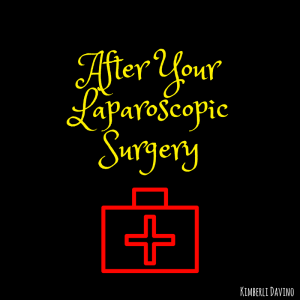Preparing for laparoscopic surgery for the first time can feel overwhelming. Last week, in part 1, I discussed 10 important things you can do to prepare for surgery. This week, I will go into detail about essentials to pack, and post-op surgery meals and what to expect during post op.
Essentials to pack
More than likely, you will get to go home the same day as your surgery. There are some cases, however, when you may have to spend the night in the hospital. This all depends on your surgery. Having an overnight bag already packed can save you loads of stress. Here are a few essentials you may want to consider sticking in your bag:
- Phone charger or any other electronics you may want to use.

Recovery after laparoscopic surgery can be overwhelming. Columnist Kimberli Davino offers tips and tricks to help ease your recovery process. - Socks and slippers.
- Extra underwear and pads; you may bleed after surgery.
- Comfy clothes for after surgery. Anything without a waistband like night gowns, oversized shirts or dresses, or even a bathrobe.
- Bathroom essentials can include toothbrush and toothpaste, lip balm, hairbrush, deodorant and lotion. You may even want to bring some dry shampoo and face wash.
- If you have a favorite stuffed animal or object, you like to sleep with, bring it.
- Book, magazines, coloring books or whatever you like to do that is relaxing and easy to carry along.
- Medicines prescribed to you, throat lozenges and stool softeners.
Post-surgery meals
Before your surgery day, it is beneficial to prepare post-op meals at least for the first week of recovery. You want to make sure these meals are light and simple to heat, because you will not want to be eating heavy or be doing any sort of cooking.
Right after surgery, you may not be very hungry. You may be nauseated from the anesthesia or medicines given to you. Drink plenty of fluids. Water and ginger ale, both sipped very slowly through a straw, helped my nausea and stomachaches.
You could try chicken broth or any light soup, toast, crackers and Popsicles. Jell-O, applesauce and very light sandwiches also were meals I had during recovery. Be sure to stay away from anything that is spicy or acidic, and be careful of having dairy right away.
Fruits and vegetables along with pasta with a little olive oil were foods I was able to start eating a few days after surgery.
What to expect during post-op
The first few days will be tiring. You will still be coming off the anesthesia, so you really will not want to do anything. You may be in pain from the gas pumped into you during surgery. Gas-X and laying flat on my back helped relieve some of this pain. Keep your heating pad close by. You also may have a sore throat from the tube in your throat to help you breathe. Throat lozenges helped clear this up quickly!
It also is crucial that you get up every once in a while and walk around slowly. This will help get the gas flowing and even help with your bloated belly. Being bed-ridden can prolong your recovery time, so it is important to make sure you move around. Of course, this will depend on exactly what you had done. It is also important that you do not overdo it. Rest is just as important, so be sure to follow your doctor’s post-op instructions.
Unless told otherwise, you can walk up and down the stairs. Be sure to go slow and have a helping hand nearby. Remember, you cannot drive right after surgery and can only drive once you have stopped taking narcotics and you feel strong enough.
Depending on how your surgery went, you will not be able to have sex for two to six weeks. Your doctor will be able to tell you exactly how long. Your first period after surgery most likely will be horrendous. I was not ready for the pain and amount of blood that came with my period after my surgery. I thought my doctor broke my woman parts. Do not panic, however. It is natural. During surgery, your doctor works on many of your reproductive organs, cutting and scraping, meaning it will take a while for everything to heal properly.
If you are taking pain meds, you will likely have constipation. Taking a stool softener with your pain medicine may help make this less painful and keep things flowing. It was my lifesaver throughout my whole recovery process.
Lastly, remember you are strong and you will get through this.
***
Note: Endometriosis News is strictly a news and information website about the disease. It does not provide medical advice, diagnosis, or treatment. This content is not intended to be a substitute for professional medical advice, diagnosis, or treatment. Always seek the advice of your physician or other qualified health provider with any questions you may have regarding a medical condition. Never disregard professional medical advice or delay in seeking it because of something you have read on this website. The opinions expressed in this column are not those of Endometriosis News or its parent company, BioNews Services, and are intended to spark discussion about issues pertaining to endometriosis.


